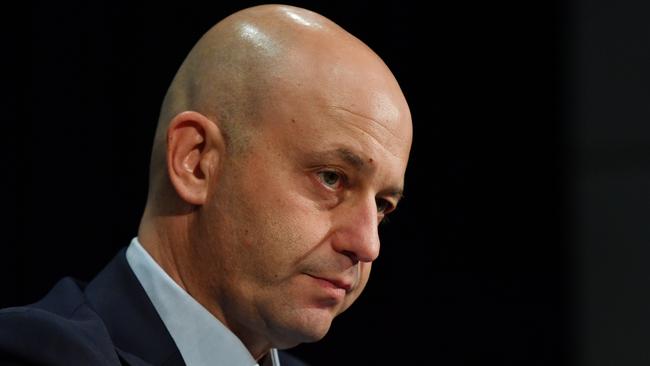Third-party cheating is so common in NRL many have become complacent
The NRL has always revealed as little as possible about salary cap cheating, as a way of protecting the game from further scandal. But the lack of transparency is only doing more damage, writes PAUL KENT.
The
salary cap is rugby league’s eternal sore. It continues to frustrate the NRL.
The punishment is worth the risk for most clubs.
Third-party payments are so common in the game many have become complacent.
When James Maloney’s negotiation with Penrith seemed to stall a few years back Maloney was asked about the holdup and was quick with his reply.
“I think they’re just trying to pass a third party or something,” he said.
Penrith blushed.

The Panthers were hoping to transfer a third party deal from Matt Moylan to Maloney to secure the deal but with Maloney’s all too honest admission that deal was now as dead as disco.
Penrith quickly told the NRL it would not be pursuing the sponsorship.
Maloney was said to have inadvertently cost himself $200,000, which was odd because part of the reason he offered for going to Penrith was because “I’m better off financially”.
Maloney was also one of the seven players named over the weekend to be unwittingly part of a payment scheme which breached NRL rules at Cronulla.

There is conjecture whether all seven players — Maloney, Luke Lewis, Wade Graham, Valentine Holmes, Josh Dugan, Jack Bird and Chris Heighington — actually got paid or whether it was just some of them.
Lewis strongly defended himself, saying he never received a cash payment from anybody, and the Telegraph does not suggest any of the players engaged in any wrongdoing.
In any event, whether all seven got the money is almost irrelevant.
What is most relevant is that Cronulla certainly discussed it internally as a means to cheat the salary cap.
And they were so blasé about the lack of policing and penalty they took it from the world of smoke and whispers and wrote it all down in an email.

The clubs and the players and their managers are entitled to feel confident.
The NRL is almost complicit in their deceit.
The NRL has always revealed as little as possible about salary cap cheating. Details of how it was actually cheated are not revealed. No player has ever been punished.
The reason was noble enough. The belief was that the game was suffering enough and that further details only added pain.
But the lack of transparency is hurting the game in this latest case. Details are being drip fed. Innuendo and rumour, speculation and gossip, they continue the conversation when the NRL hoped the punishment would finalise it.

It is causing the NRL to have a rethink.
Should the entire breach notice be published? It is being strongly considered.
At least everybody would know the truth.
Fans could see who is responsible and who has been made accountable.
At the same time the NRL is also considering how to clean up the third party mess.
A simple solution is for the NRL to take over all third party negotiations. It is so simple it is a great mystery why the NRL has not done it already.
By definition nothing, intrinsically, should change. Any player that represents value to a brand would still be able to represent them.
Yet this changes dynamically if the NRL takes over all third party deals.

It would mean any company hoping to have a player represent their brand would have to approach the NRL instead of the club to secure the deal.
Some will argue the NRL already has to approve every third party deal so that doesn’t change much at all.
But it does.
Most importantly it stops clubs from dangling third party deals in front of players as part of the negotiation process.
Such conversations are against the rules but happen often.
A player wants $500,000 but the club has only $400,000 left in the cap. Or is prepared to spend only $400,000 of its cap.
So with a nudge and a wink the club tells the player it will pay him $400,000 and find another $100,000 in third parties.
The club just has to distance itself from the deal when the player presents the deal to the NRL and how successfully this is done often determines the success of the deal.
The Sharks formed a secret company whose intention was to secure third party deals at arm’s length from the club.
The NRL is already considering a more drastic action.
Instead of giving the clubs their $13 million grant, from which the clubs then pay their players, the NRL is considering holding back the money and paying the players centrally from headquarters.
The NRL is now looking at the player managers but nothing will happen. The historical nature of their cheating means they will be subject to the same powers that failed to prosecute a single manager from Parramatta’s salary cap cheating.
Somewhere, in all this, something has to change.


